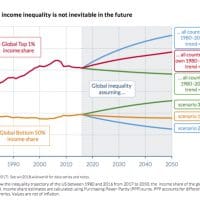-
After alienation
Since the collapse of the Berlin wall and the Soviet Union, many on the left seem to have swallowed the idea that there is no alternative to capitalism.
-
Leaked nuclear posture review lays out policy changes that would increase risk of nuclear war
A draft of the 2018 Nuclear Posture Review leaked to the Huffington Post indicates that the White House is planning changes to the U.S. nuclear arsenal and its nuclear-use policy that would increase the risk that nuclear weapons will be used.
-
On the contribution of István Mészáros (1930-2017) to critical thinking
István Mészáros, an outstanding Hungarian Marxist philosopher, died on October 1st 2017 in London. Born in Budapest in 1930 into a working-class family, brought up by his mother, he began working in industry at the age of twelve. He actually lied about his age, claiming to be sixteen, in order to be accepted by the factory.
-
Abolition feminism: Theories & practices
Nicos Poulantzas Institute presents Angela Davis for the Eleventh Annual Nicos Poulantzas Memorial Lecture.
-
‘On new terrain’—How Capital is reshaping the battleground of class war
Since the Great Recession there has been much debate on the nature of capitalism and the crisis of neoliberalism. Often this has resulted in theories which emphasise finance capital, precarious employment, and play to a generally left Keynesian politics, such as that being pursued within the Labour Party currently.
-
The U.S. role in turning countries into shitholes and provoking immigration
Since Trump is a racist, he thinks that countries get to have poor economic and security situations because of the race of the people that inhabit them. That is silly (and dangerous) as history and social science.
-
The feminist eagles
Long before the present resurrection of this emboldened feminist movement (forcing people to frantically Google the term), I sensed it coming as the teacher advisor of my high school’s feminist club, the Feminist Eagles.
-
Humans, “aliens,” and “shithole countries”
There is no evidence that Donald Trump has ever in his life performed a single selfless act, let alone any act of heroism. Probably he wouldn’t be able even to imagine the nobility of character I witnessed among Port-au-Prince residents after the earthquake, and among “alien” activists like Ravi and Jean here in New York.
-
The total Marx and the total theory of literature
Revolutionary reflections is proud to publish a lost gem of Marxist aesthetic theory by Ian Birchall. Originally the piece was given as a paper at a conference on the Grundrisse and the “total Marx” on 5 June 1971 (the day after the death of Marxist theoretician Georg Lukács). It was published in Situating Marx: Evaluations […]
-
The elephant in the world
The authors of the report confirm what Branko Milanovic and others had previously discovered: that a representation of the unequal gains in world economic growth in recent decades looks like an elephant. Thus, the real incomes of the bottom 50 percent of the world’s population (except the poorest, at the very bottom) have increased, the incomes of those in the middle (especially the working-class in the United States and Western Europe) have decreased, and the global top 1 percent has captured an outsized portion of world economic growth since 1980.
-
Trump, the Nationalist-Populist Movement, and Wolff’s Fire and Fury
The real story of Wolff’s Fire and Fury—ignored by an establishment media that has no interest in revealing anything about the class struggle—is the rise of the nationalist-populist movement, which has used Trump effectively to grow its base.
-
Is casual surveillance the future of capitalism?
When e-commerce monolith Amazon introduced the Key in October, it was the latest in a series of innovations aimed at making our lives more user-friendly. Available exclusively to subscribers of Amazon Prime, the Key system—which consists of a programmable smart lock for the front door of one’s house, and a high-definition camera mounted nearby to record the activity of those who come and go—allowed users to have “Amazon packages securely delivered just inside your front door,” as opposed to having those purchases left on a front porch or in a mailroom.
-
NUMSA New Year Statement: A clarion call to build a Revolutionary Workers Party!
Comrades 2017 was a year where the global crisis of capitalism deepened. Just like the 2008 global financial crisis, capitalism demonstrated once more that it has failed humanity and has no solutions for problems that are confronting society.
-
Class, race, and U.S. wealth inequality
People tend to have a distorted picture of U.S. capitalism’s operation, believing that the great majority of Americans are doing well, benefiting from the system’s long-term growth and profit generation. Unfortunately, this is not true. Median wealth has been declining, leaving growing numbers of working people increasingly vulnerable to the ups and downs of economic […]
-
Marx on imperialism
On February 19, 1881, Karl Marx had written a remarkable letter to N.F. Danielson, the renowned Narodnik economist who had also gone under the name of Nikolayon and whose work had been much discussed by Lenin.
-
The productive base as the ground of society and history: Marx’s base-superstructure theory
Base-Superstructure Theory (BST) is Marx’s guiding general theory, but is long misunderstood. Deeply embedded in a monumental corpus of system-challenging analysis, it has become lost in secondary interpretations with partial takes and opposed propagandas militating against coherent comprehension.
-
No Berlin Bulletin—just birds and hopes
The fights which must be fought and difficulties endured may perhaps be a mite easier and lighter if accompanied by occasional deep breaths of nature with its simple joys, and the freedom hopes, the values and solidarity I sometimes found there and enjoyed so greatly, may also contribute just a little to efforts of good people everywhere in our good cause.
-
The Odious Iraqi Debt
This article, originally written towards the end of 2003, is now published on our website for the first time in English. The odious Iraqi debt is still under-documented today, though it is highly relevant in our research and our proposals against all illegitimate, illegal, odious and unsustainable debts. It is a rare case where a […]
-
The crisis in neoliberalism and its ramifications
The neoliberal model that has dominated mainstream politics and economics for decades is in crisis.… Mass dissatisfaction has joined with the growing realisation by the managers of the capitalist system that neoliberal policies are incapable of dragging the world economy out of the rut in which it now finds itself 10 years after the onset of the global financial crisis.
-
Naming Capitals
For the republican Arab world, the past twelve years have been defined by foreign invasion, civil and proxy wars, revolution and counter-revolution. It has been devastating. However, it should be remembered that, within the republican Arab world, the twenty-first century began with the American backed crushing of the second Palestinian uprising (intifada).




















